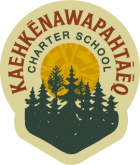
ABOUT US
Kaehkēnawapahtāēq bases it’s educational model on a number of pedagogies that are aimed at finding a closer form of how our Menominee ancestors were educated for generations.
Menominee Education: Kaehkēnawapahtāēq is our oldest form of knowledge passing from one generation to the next. It means “We learn by observing.” Our original learning styles, historically and traditionally, come from two sources: ācemwan (verbally/stories) and Kaehkēnawapahtāēq (observing/learning by watching others). Generation after generation a lifetime of knowledge was passed to the children this way. As children grew, they naturally began participating in these daily living skills that they observed. Not only were daily living skills of wild rice harvesting, maple sugar processing, bark harvesting for basketry and proper language being acquired; it was equally important to learn emotional control, self-regulation, and the ability to work through issues and problems independently, as well as achieving shared community goals while working collectively with others. Kaehkēnawapahtāēq will be Menominee language immersive, meaning our method of delivery will be almost entirely in our traditional language. Menominee Language Immersion and Dual Language Immersion (Menominee and English) approaches allow natural and organic ways for children to learn traditional as well as academic content in Menominee with the inclusion of parts of the day spent in the English language.
Montessori Education: Maria Montessori was an Italian doctor and educator. Her groundbreaking work led to understanding how careful observation of children, their needs and their tendencies at different stages of their development would help them to realize their unique potentials.
The decision process of how to approach teaching Menominee youth through our language and cultural activities required the Charter School development team to look at many different “alternative” approaches to Western education and they decided that reconnecting to a child-centered learning approach would be fundamental to reconnecting to our traditional Indigenous teaching methods. The Montessori method places emphasis on social, cultural, emotional, spiritual, physical, and intellectual development. This emphasis on holistic education will enable our children to adapt and create and contribute to our Menominee community in the healthy ways in which our ancestors were taught.
Our teachers will take on the responsibility of serving as guides in our childrens’ learning. The teachers will organize specific tasks in their classrooms according to five different areas (Practical Life, Sensorial, Language Arts, Mathematics, and Culture/Science) identified by Montessori as integral to child development. Our children are free to choose when they will tackle these specific tasks according to their comfort levels, they choose the materials they will use and they choose how long they work on them. The teacher, acting as guide, will carefully observe the choices our children make and develop a curriculum for each individual child based on those choices. Montessori places a strong emphasis on the inner preparation of the teacher as a guide, role model, and educational companion to the child.
The decision to adopt the Montessori approach into our traditional Menominee education practices came from its emphasis on the educational environment being organized to develop internal discipline, rather than being defined and imposed by the curriculum as is the case in the public schools. For Menominee people, self-discipline and the desire for harmony between the self and the environment are core values. In contrast to the public school approach in which the teacher maintains authoritarian control over learning, Montessori and Menominee beliefs emphasize that children learn best when they are treated respectfully, and when their own motives and intentions are taken seriously.
The ultimate goal of Montessori is the well-balanced, responsible individual who can function both independently and collaboratively in any setting. Our Menominee goal is to help our children become good elders. Developing core values of respect, responsibility, reciprocity and relationship will foster spiritually and culturally grounded individuals. The Montessori method is one way to help us to reconnect with Menominee teaching and learning philosophy and practices. Most importantly, it adds the important dimension of preparation for formal education, which all children must have, and it does so in ways that are respectful of the cultural and linguistic imperatives of Menominee original ways of being.
Quick Links
Harvest of the Moons Curriculum
https://healthyliving.extension.wisc.edu/programs/harvest-of-the-moon/
American Indian Traditional Foods in USDA School Meals Programs
https://dpi.wi.gov/sites/default/files/imce/school-nutrition/pdf/amer-ind-trad-foods-toolkit.pdf

